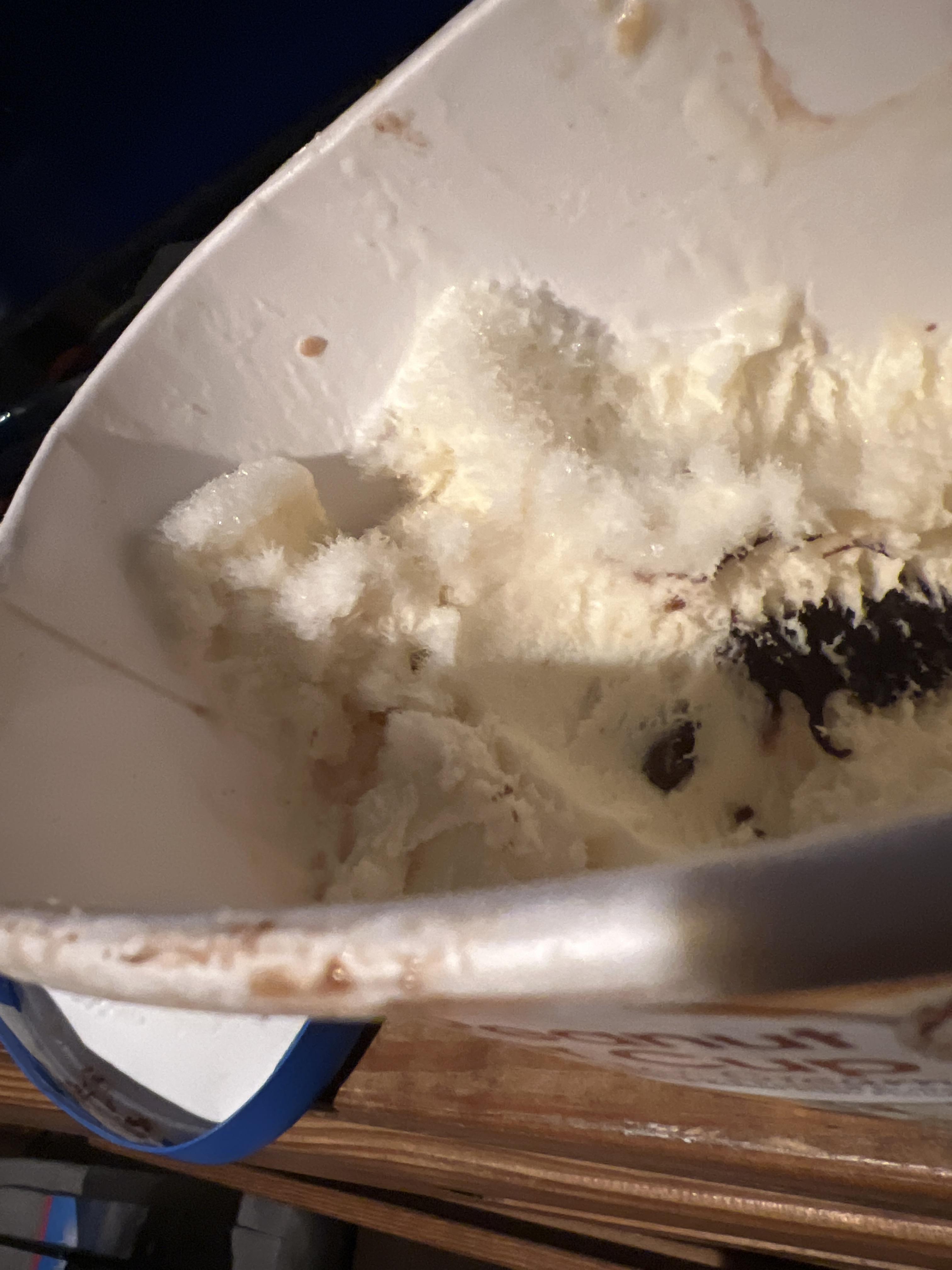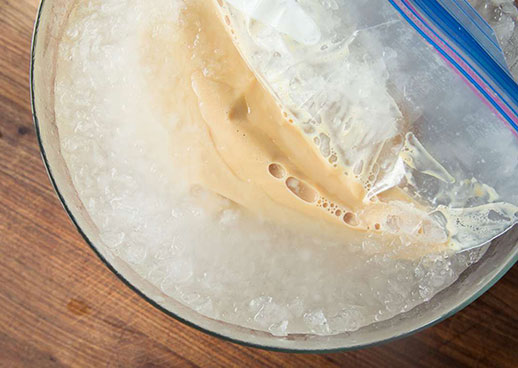What Is Ice Cream Spoilage?

Ice cream spoilage refers to the deterioration of ice cream, resulting in changes that make it unsuitable for consumption. It occurs when the quality and freshness of the ice cream degrade over time, leading to physical and sensory changes. These changes may include the formation of ice crystals, a grainy texture, discoloration, and off-flavors. Spoiled ice cream can also pose a risk to health if consumed. Understanding ice cream spoilage is essential for ensuring food safety and preventing the consumption of expired ice cream. Proper storage and handling techniques can help reduce the risk of spoilage and prolong the shelf life of ice cream.
Understanding The Concept Of Ice Cream Spoilage
Ice cream spoilage refers to the deterioration of ice cream, resulting in changes that make it unsuitable for consumption. It occurs when the quality and freshness of the ice cream degrade over time, leading to physical and sensory changes. These changes may include the formation of ice crystals, a grainy texture, discoloration, and off-flavors. Spoiled ice cream can also pose a risk to health if consumed. Understanding ice cream spoilage is essential for ensuring food safety and preventing the consumption of expired ice cream. Proper storage and handling techniques can help reduce the risk of spoilage and prolong the shelf life of ice cream. [1]
Factors That Contribute To Ice Cream Spoilage
Several factors can contribute to ice cream spoilage. These factors include temperature fluctuations, improper storage conditions, exposure to air, and the presence of bacteria or contaminants. When ice cream is exposed to warm temperatures and then refrozen, it can cause the formation of ice crystals, leading to a grainy texture. Opening and closing the ice cream container frequently allows air and moisture to enter, leading to freezer burn and spoilage. Additionally, if ice cream is contaminated with bacteria or other microorganisms, it can lead to spoilage and potential health risks. Proper storage and handling practices are essential in preventing ice cream spoilage.
Signs Of Expired Ice Cream

Expired ice cream can exhibit several signs that indicate it is no longer suitable for consumption. These signs can include changes in texture, such as the formation of ice crystals or a grainy consistency. Furthermore, expired ice cream may develop an off-putting odor or taste. It may also have a darker color than fresh ice cream. Mold growth or visible signs of spoilage, such as a slimy texture, should also be taken as indications of expired ice cream. When these signs are present, it is important to discard the ice cream for safety reasons.
Physical Changes In Expired Ice Cream
Physical changes in expired ice cream can be easily observed. One common change is the formation of ice crystals or a grainy consistency. The texture of the ice cream may become unpleasantly icy or excessively soft. Additionally, the color of expired ice cream may darken and become unappetizing. Mold growth or visible signs of spoilage, such as a slimy texture, can also indicate that the ice cream has expired. These physical changes serve as clear indicators that the ice cream is no longer suitable for consumption and should be discarded immediately to ensure food safety.
Odor And Taste Changes In Expired Ice Cream
When ice cream expires, it may develop an unpleasant odor that is indicative of spoilage. The smell can range from sour to rancid, indicating the presence of harmful bacteria. Additionally, the taste of expired ice cream can be off-putting, with a bitter or metallic flavor. These odor and taste changes occur due to the breakdown of fats and the growth of microorganisms in the ice cream. It is important to trust your senses and discard ice cream that has an abnormal odor or taste to ensure your safety and enjoyment of the dessert.
Can Ice Cream Expire?

Yes, ice cream can expire. While the expiration date on ice cream containers serves as a guideline for quality and taste, it is not a definitive date for spoilage. Over time, ice cream can develop an unpleasant odor, taste, and texture, indicating that it has gone bad. Consuming expired ice cream can pose health risks due to the growth of harmful bacteria. To ensure your safety and enjoyment, it is important to trust your senses and discard any ice cream that has passed its expiration date or has noticeable signs of spoilage.
Exploring The Expiration Date On Ice Cream Containers
When it comes to ice cream, the expiration date serves as a guideline for quality and taste. Most ice cream containers will have a printed expiration date, indicating the recommended timeframe for consuming the product at its best. However, it is important to note that this date is not a definitive indicator of spoilage. It is always recommended to inspect the ice cream for any physical changes, such as ice crystals or discoloration, and to use your senses to determine if it has developed an off-putting odor or taste. Trusting your instincts and following proper storage and handling practices will ensure you are enjoying ice cream at its peak freshness.
Determining If Ice Cream Is Safe To Consume After The Expiration Date
After the expiration date has passed, it is essential to assess whether ice cream is still safe to consume. While the expiration date provides a guideline for optimal quality, it does not necessarily indicate spoilage. To determine if the ice cream can still be enjoyed, it is crucial to inspect its physical appearance and check for any signs of spoilage, such as the presence of ice crystals or discoloration. Additionally, trusting your senses is essential—look out for any unusual odors or off-putting tastes. If any of these signs are present, it is best to discard the ice cream to avoid potential illness.
Proper Storage Of Ice Cream

It is crucial to store ice cream properly to prevent spoilage and maintain its quality. Proper storage conditions are essential to preserve the flavor and texture of ice cream. Here are some important tips for storing ice cream:
- Keep it frozen: Ice cream should always be kept in the freezer at a temperature of -18°C or lower. This will prevent the growth of bacteria and maintain its freshness.
- Seal it tightly: To avoid freezer burn and prevent the formation of ice crystals, store ice cream in a tightly sealed container. This will help to retain its smooth and creamy consistency.
- Avoid temperature fluctuations: Limit opening the freezer door frequently to maintain a consistent temperature. Fluctuations in temperature can cause ice cream to thaw and refreeze, affecting its texture and taste.
- Store away from strong odors: Ice cream can absorb strong odors from other foods in the freezer. To prevent this, store it in a separate section or in a freezer-safe bag.
By following these storage tips, you can greatly extend the shelf life of ice cream and ensure that it remains delicious and safe to consume.
The Importance Of Proper Storage Conditions For Ice Cream
Proper storage conditions play a crucial role in maintaining the quality and freshness of ice cream. Storing ice cream at a temperature of -18°C or lower prevents the growth of bacteria and preserves its flavor and texture. Sealing the container tightly helps to avoid freezer burn and the formation of ice crystals, ensuring a smooth and creamy consistency. Limiting temperature fluctuations by minimizing freezer door openings helps to prevent ice cream from thawing and refreezing. Additionally, storing ice cream away from strong odors keeps its taste from being altered. Following these storage practices is essential for enjoying delicious and safe ice cream.
Tips For Storing Ice Cream To Prevent Spoilage
- Always store ice cream in the freezer at a temperature of -18°C or lower to maintain its freshness and prevent bacterial growth.
- Seal the container tightly to avoid freezer burn and the formation of ice crystals, which can affect the texture and taste of the ice cream.
- Place the ice cream at the back of the freezer where it is colder, away from the freezer door to minimize temperature fluctuations caused by frequent openings.
- Keep ice cream away from strong odors in the freezer to prevent it from absorbing any unwanted flavors.
- Avoid thawing and refreezing ice cream as it can result in a loss of quality and promote the growth of bacteria.
Extending The Shelf Life Of Ice Cream

If you want to extend the shelf life of your ice cream, there are a few methods you can try. First, make sure to keep the ice cream stored in a freezer set at -18°C or lower. This will help maintain its freshness and prevent bacterial growth. Additionally, you can use additives and stabilizers, such as guar gum or carrageenan, to enhance the preservation of the ice cream. These ingredients can help prevent the formation of ice crystals and improve the texture of the ice cream. By following these tips, you can enjoy your ice cream for a longer period of time.
Methods To Prolong The Freshness Of Ice Cream
There are several methods you can try to prolong the freshness of ice cream. Here are a few techniques:
- Keep it frozen: Ensure that the ice cream is stored in a freezer set at -18°C or lower. This will help maintain its freshness and prevent bacterial growth.
- Avoid temperature fluctuations: Limit the number of times you open the freezer door and avoid leaving the ice cream out at room temperature for an extended period. Fluctuations in temperature can lead to melting and refreezing, which can affect the texture and quality of the ice cream.
- Use airtight containers: Transfer the ice cream into airtight containers to prevent air exposure, which can cause freezer burn and impact the taste and texture.
- Place it in the back of the freezer: Storing the ice cream at the back of the freezer, away from the door, can help maintain a more stable temperature and protect it from temperature fluctuations.
- Use additives and stabilizers: Consider adding additives such as guar gum or carrageenan to the ice cream mixture. These ingredients can help prevent the formation of ice crystals and improve the texture and overall freshness of the ice cream.
By following these methods, you can ensure that your ice cream stays fresh and enjoyable for a longer period of time.
Using Additives And Stabilizers To Enhance Ice Cream Preservation
Additives and stabilizers play a crucial role in enhancing the preservation of ice cream. These ingredients are added to the ice cream mixture to improve its texture, prevent the formation of ice crystals, and maintain the overall freshness of the product. Additives such as guar gum and carrageenan help to stabilize the ice cream and keep its consistency smooth. These additives also contribute to preventing melting and refreezing, which can degrade the quality of the ice cream. By using these additives and stabilizers, manufacturers can extend the shelf life of ice cream and ensure that consumers can enjoy a delicious and fresh product for a longer period of time.
Conclusion

In summary, understanding ice cream spoilage is essential for maintaining food safety. While ice cream does not have a true expiration date, it can still go bad due to factors such as temperature fluctuations, improper storage, and the presence of contaminants. To ensure the longevity of ice cream, proper storage conditions, such as keeping it at a consistent temperature and avoiding repeated thawing and refreezing, are crucial. Additionally, the use of additives and stabilizers can help enhance ice cream preservation. By following these guidelines, consumers can enjoy ice cream that is fresh, safe, and delicious.
Summary Of Key Points
Understanding ice cream spoilage is essential for maintaining food safety. While ice cream does not have a true expiration date, it can still go bad due to factors such as temperature fluctuations, improper storage, and the presence of contaminants. Signs of expired ice cream include physical changes in texture and appearance, as well as changes in odor and taste. Proper storage conditions, such as keeping ice cream at a consistent temperature and avoiding repeated thawing and refreezing, are crucial for prolonging its shelf life. Additionally, the use of additives and stabilizers can help enhance ice cream preservation. By following these guidelines, consumers can enjoy fresh, safe, and delicious ice cream.
Importance Of Understanding Ice Cream Spoilage For Food Safety
Understanding ice cream spoilage is essential for maintaining food safety. It is crucial to be aware of the signs and factors that contribute to ice cream going bad in order to prevent any potential risks to health. By knowing what to look for, consumers can avoid consuming expired ice cream that may be contaminated with harmful bacteria or toxins. Proper storage and handling techniques can also help prevent spoilage and maintain the quality and safety of the ice cream. Being knowledgeable about ice cream spoilage ensures that consumers can enjoy their frozen treat with peace of mind.
Frequently Asked Questions About Expiration of Ice Cream
Q: Can ice cream expire?
A: Yes, ice cream can expire. Like most food items, ice cream has a shelf life and can go bad if not consumed within a certain period.
Q: How long does ice cream last before it expires?
A: The shelf life of ice cream varies depending on various factors such as the type of ice cream, storage conditions, and ingredients used. Generally, most commercially produced ice cream will have a best-before date that indicates its optimal quality and flavor. It is recommended to consume ice cream within this timeframe for the best taste.
Q: What happens when ice cream expires?
A: When ice cream expires, it can undergo flavor and texture changes. It may develop ice crystals, become grainy, or lose its creamy consistency. The taste can also become unpleasant or rancid. Consuming expired ice cream might not necessarily make you sick, but it is best to avoid eating it to ensure quality and safety.
Q: Does ice cream go bad in the freezer?
A: Although freezing can slow down the spoilage process, ice cream can still go bad in the freezer, especially if stored for an extended period. Constant temperature fluctuations or improper storage conditions, such as exposure to air or light, can affect its quality. It is advisable to consume ice cream within a reasonable time even when stored in the freezer.
Q: How can I tell if ice cream has gone bad?
A: Signs that ice cream has gone bad include an off-putting smell, unusual texture, or freezer burn. If the ice cream appears discolored or has formed large ice crystals, it’s an indication that it’s no longer suitable for consumption. Trust your senses and the appearance of the ice cream to determine if it has gone bad.
Q: Can I still eat ice cream after its expiration date?
A: It is generally safe to consume ice cream a few days past its expiration date, although its quality may have degraded. However, if the ice cream exhibits clear signs of spoilage, such as an unusual odor, a curdled appearance, or a moldy growth, it is best to discard it.
Q: Can I freeze ice cream to extend its shelf life?
A: Yes, freezing can help extend the shelf life of ice cream, but it is important to ensure proper storage conditions. Store ice cream in an airtight container to minimize exposure to air and prevent the formation of ice crystals. Be aware that even when frozen, ice cream will eventually develop freezer burn and its quality will decline over time.
Q: Can homemade ice cream expire faster than store-bought?
A: Homemade ice cream can expire faster than store-bought ones. This is because homemade ice cream often lacks the stabilizers and preservatives typically found in commercially produced ice creams. The absence of these additives can lead to faster spoilage, making it essential to consume homemade ice cream within a shorter time frame.
In conclusion, ice cream can indeed expire, and its quality can deteriorate with time. To enjoy the best taste and texture, it is recommended to consume ice cream before the expiration date and store it properly in the freezer to maintain its quality for as long as possible.

Soo Good Snack Bar is an upscale snack shop located at 1309 Hermosa Ave. in Hermosa Beach, CA. This family-owned business is the newest addition to the community of Hermosa, and our goal is to create a fun and inviting place where families can enjoy delicious snack foods that fit the beach lifestyle. Check us out today and help yourself to happiness.
